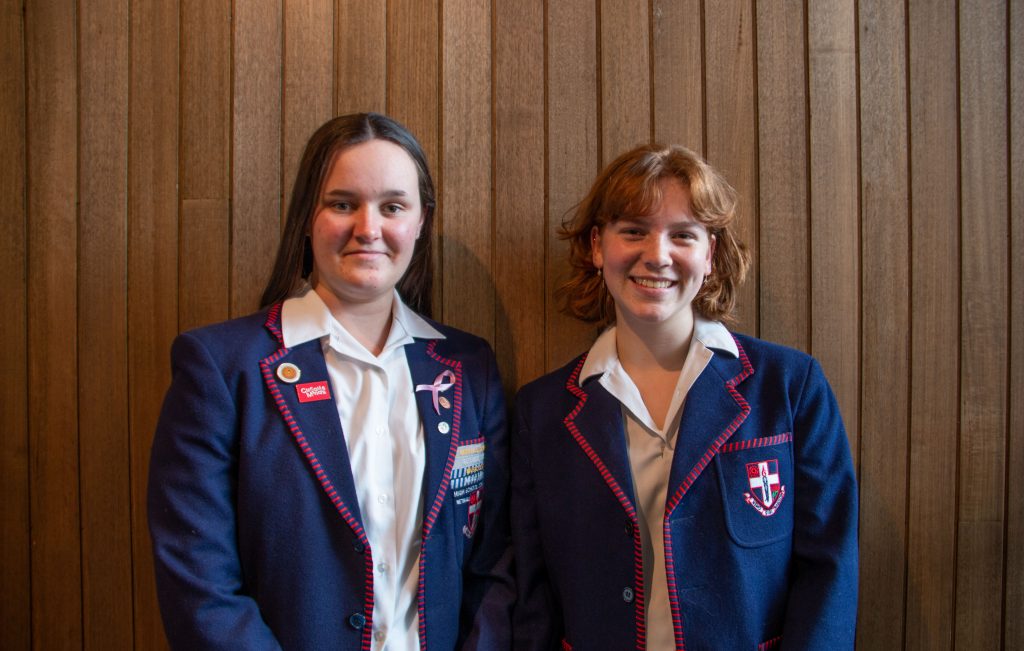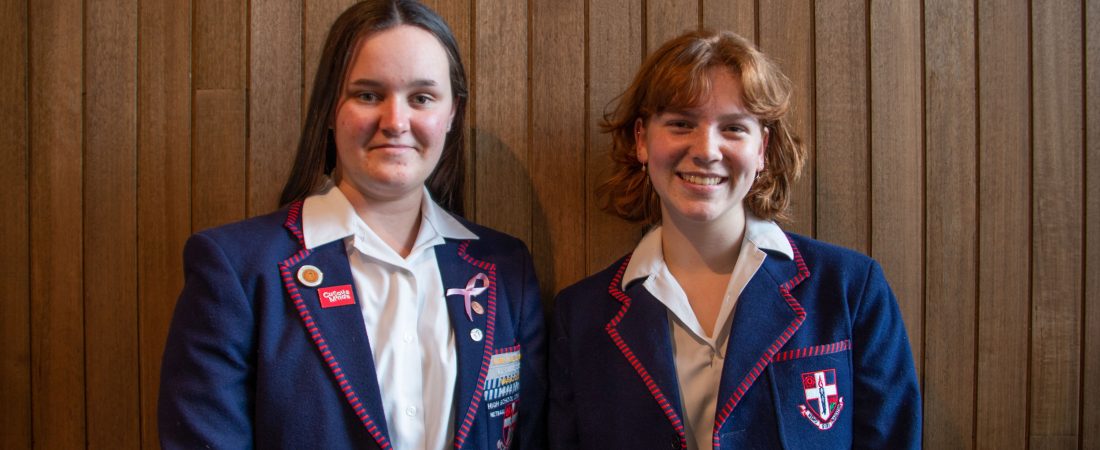Jean Yeates Writing Prize 2022
Posted on September 2, 2022

Jean Yeates, after whom this prize was named, was a former staff member at the School. She was born in 1916 and lived to be 80 years old.
There is a short passage about Jean from Kathy Rundle’s book People of the School, which cites Jean as having ‘a passion for the English Language, … devotion to education, … and the difference she made to many students’ lives over her 30 years of service at The Friends’ School’.
This year we were delighted to welcome Amanda Lohrey as the judge of the Jean Yeates Writing Prize. Amanda is the author of acclaimed novels Camille’s Bread, Vertigo, and The Morality of Gentlemen, among other award-winning short story collections such as Reading Madame Bovary. She was the winner of the Patrick White Literary Award in 2012, and won the Miles Franklin Award for Labyrinth in 2021.
Amanda shared with us about the journey of the writer, their engagement with the audience, and made the announcement of this year’s Jean Yeates Writing Prize winner.
Year 11 student Ruby Scully won this year’s prize for her poem ‘Compliance’. Amanda noted the following about Ruby’s entry:
“I really enjoyed this poem. I read it several times and it stayed fresh for me each time…. A poem must have rhythm. A poem is, in essence, a song… it’s an incantation. And part of the meaning of a poem is the musical effect on the ear: the hypnotic music of that incantation. And this is what was so wonderfully understood and rendered in Ruby’s poem. Her command of that was unfaltering. There were no clunky phrases, there were no awkward bits, there were no lapses—the song was complete and unvarying and that really impressed me. The poem is nominally, or apparently, about stage fright: she takes the common experience we all have of stage fright, but she uses it to explore the masks that we sometimes adopt to disguise who we are in order to please other people. And the poem lays out many cross-currents and images of the self that are involved in the public performance of the self—not only on the stage, but off the stage—and how we perform our individual identity: what’s expected of us, how do we respond to this, how do we feel while we’re, in a sense, impersonating ourselves. And her poem had that complexity; but, I would stress ‘complexity’ not ‘obscurity’; it’s very accessible. And to be both complex and clear is an art in itself. In every line of the poem there is clarity: both of thought and of poetic diction, that is, the way in which we use words to create a personal style.”
You can read Ruby’s winning entry below.
Compliance | by Ruby Scully (Year 11)
She watches in the wings,
Waiting.
The curtains on the other side
Ripple restlessly.
They whisper of fate, of failure.
They hold ghosts in their folds.
They watch the girl,
Waiting.
Her time comes.
The stage feels bigger when you’re on it.
She sees many faces, many eyes, many frowns.
They are far from her, blurred.
Her feet are light, quick, running to catch up with the music.
They spark,
Flames fly up her legs.
Curls of smoke
Float to the heavens;
She’s burning under the spotlight.
Her smile sticks,
Sweeter than honey,
Hotter than the sun,
It’s plastered in place.
Her skin cracks and blisters
Blood pours from her mouth,
Tears from her eyes.
Her flesh bubbles and nerves crawl under her skin,
Screaming to be set free.
She twists in the heat.
She is burnt to a crisp, leeched of identification.
Something is left on that desert stage.
Not her, but so close.
It has her face, her eyes.
It knows her memories, her secrets.
It guards them like a starving dog.
It has her tricks, her traits.
It has her name.
It dances on an empty stage,
The light catches its ankles, its calves, its impossibly strong feet.
The girl who couldn’t stay in time is gone,
And a translucent replica is left.
The audience claps;
It fits their expectations.
Year 12 student, Lily Neyland’s short story entry titled ‘Beach Glass’ was announced as Runner-up. Amanda observed the following about Lily’s writing:
“‘Beach Glass’ was very fine: it’s non-fiction; it’s a memoir of [Lily’s] time at a family beach shack and focuses on her grandfather’s love of searching the beach for glass. And she uses this very rich image of ‘…the ocean smooths fragments of glass…’ to create a portrait of her grandfather as an appealing and yet ultimately, unknowable, figure. So, there’s both the familiarity of the loved one but also the essential mystery: the sense that we never entirely know another person, no matter how close to them we are. Her piece is a very good example of how, if you find the right image—not a metaphor, not a symbol—but an image for what you want to convey, you’re halfway there. And, Lily finds this in the image of the pieces of beach glass and she uses them to… create a portrait both of her childhood and of her grandfather….Lily’s piece also exhibited very good management of narrative time: she moves backwards and forwards between childhood and adolescent reminiscence in a very fluid way, and the management of time is not always easy to control in a story so, that impressed me as well.”
You can read Lily’s runner-up entry below.
Beach glass | by Lily Neyland (Year 12)
My grandparents bought The Shack in 1982. It was a quirky old place, surrounded by a National Park, in a neighbourhood of 20 or so other shacks. It had a classic shack-like character – a bit wonky, mismatched bedding and furniture, possums inhabiting the chimney in the shed. Over the years, many a memory was created within the walls of that shack – foraging through buckets of blueberries, not being able to watch ‘Play School’ because the flood coverage was on, arguments over games of monopoly.
But to me, it was the memories created outside the shack that were the most important: walks along the beach, catching tadpoles, crabs and yabbies, and ‘dam busting’ the ‘tea factory’, the little creek that only ran when the rain fell for days on end. In later years, I remember trips with friends, snorkelling with seals, and stingrays giving me the fright of my life.
Out the front of the shack, slightly to the right, if you looked out the window from the dining table, was ‘Our beach’. It wasn’t very long, perhaps 100 metres, but it was always there. The shape would change, the sand would move around, and the tannin-stained creek at one end would go through periods of flood and drought. The tides changed it too. A narrow sandy strip at high tide, then at low tide, rockpool after rockpool was revealed. But even as the physical nature of the beach changed, my love for the beach never did.
It was a kid’s paradise, perfect for someone like me, adventurous at heart. So many footprints are held in that sand, washed away soon after by the tides, but still ingrained in the history of the beach, and my childhood.
No matter the visit, no matter our company, the beach was always a constant. And each time, as we drove along the driveway, be it light or dark, rain or sun, the first job was to go and check out ‘Our Beach’. To see what had changed, what was unfamiliar. To see what adventures awaited.
* * *
No other beach feels quite like ‘Our Beach’, no other beach has so many memories associated with it.
And no other beach gives me such a strong connection to my grandfather, a grand old man who I never got to meet.
Although I never met him, two facts about his life stand by me; he was an optometrist, and he loved beach-washed glass. The two types of glass juxtapose each other; new and perfect, old and sullied.
Perhaps the two were connected – working with people’s optical glasses all day, then spending weekends and holidays searching for smooth, tumbled, almost ‘natural’ pieces of glass. Perhaps there was no connection at all. But either way, I know he loved glass, in many forms.
I can almost picture him, walking along the beach in front of our shack, the sun setting over ‘The Nut’, waves washing over the sharp quartzite rocks. Wave washed swirls of seaweed lining the high tide mark, a kid’s footsteps from earlier in the day following closely alongside. And there, elusively hiding beneath it – a piece of beach glass.
For some, it was the thrill of finding a cowrie, a ‘money shell’, and then the ensuing disappointment of discovering the hole in it – it wasn’t nearly as special if it had a hole – and then the satisfaction of taking it back to the shack and putting it into ‘the jar’. For others, thrills stemmed from finding smooth operculums, sea urchins or other salty, sandy treasures. Or perhaps it was the smell of the salt in the air, wind rushing past your ears, the calls of the gulls and the currawongs echoing in both ears. But for him, it was the glass. Perhaps brown, green, or white. Or if he was lucky, a shade of blue or purple, a rarer find. Some were new, chipped and clear. But the best finds were those that had been tumbled in the wild west coast waves, getting smoother with each passing day – rounded edges, perfect curves. Those that had weathered the test of time, each day of their existence concealed somewhere in their scoured surface.
Back at the shack, he’d add it to the collection. There was a cowrie jar, but there was also another jar. A jar for his glass. The dominant browns subdued the other colours, but the vibrant pieces still stood out among the rest. The mismatched shapes fitted inside one another, creating a collage. Over the years, the collection grew. More and more pieces found their way to Our Beach, then into his hands, before finally coming to rest among similar fragments in the jar.
* * *
Occasionally over the years, I’ve found a nice bit of beach glass, and added it to his collection. More often than not though, I’ll throw the pieces back into the waves, ready for someone else to experience the same delight in finding them.
In a way, it keeps his spirit alive, knowing that he’s still out there, looking over me, keeping an eye on things. Because I know, no matter where I am in the world, no matter which beach I’m wandering, if I look hard enough, there’ll always be a piece of beach-washed glass somewhere nearby.
We congratulate these two students on their success.
